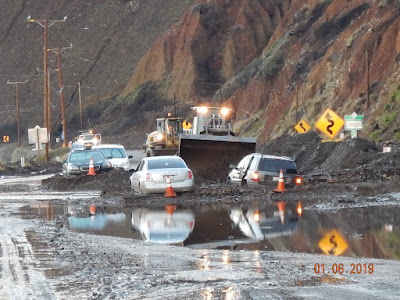This week we are discussing 'mass wasting' events...
Landslides in the United States cause approximately $3.5 billion in damage, and kill between 25-50 people annually. The largest landslide in modern U.S. history (in terms of volume) was most likely one that occurred in 2013 in Bingham Canyon outside of Salt Lake City, Utah. It had a slide mass of 55 million cubic meters (compared to an estimated 10 million cubic meters during the Oso event in 2014, see image below).
Landslides impact California’s terrain often. These are generally related to precipitation patterns, in particular if there has been previous months of drought conditions. In January 2019, Pacific storms brought a lot of rainfall to the state. The heavy rain forced residents to evacuate from wildfire-ravaged areas. The “high risk” areas for mudslides are so because they are adjacent to steep slopes or are located at the base of drainage areas. Recent examples are the ‘Woolsey’ and the ‘Hill’ fire burn areas, which will be subject to high volume of mud and debris flow moving forward. The photo below shows a 2019 example.

I can see from the pictures that the landslide happened in an area that is heavily saturated with trees, meaning roots did hold up the ground to a certain extent. My question is was the water that I can see at the bottom of the landslide moving and cutting on the on the slope or was it stationary and just slowly saturated the slope?
ReplyDeleteHi Stan, good question! I believe most of the water in the picture is what the river looked after the event...
ReplyDeleteThis link is cool one to see the before/after pictures
https://www.independent.co.uk/news/world/americas/washington-mudslide-death-toll-rises-24-incredible-and-after-images-show-devastation-oso-landslide-9216428.html
The textbook mentions Portugese Bend, which is located in California. I live right next to Portugese Bend! I thought it was pretty cool that the textbook mentioned it. I have experienced the landslide hazards first hand. They are constantly having to repave the road, because the land is constantly moving.
ReplyDeleteAwesome Madison!~~ pretty cool...huh?
ReplyDelete